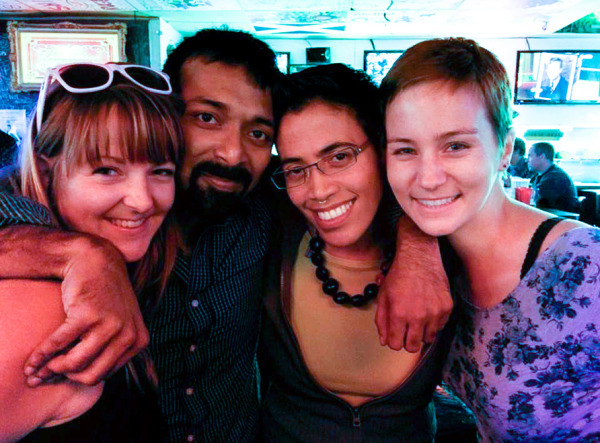
The beginning of the Fall Quarter means that it’s audition season for many a cappella groups and theater companies. However, what you may not realize is that you can also audition for three graduate theater projects that will be performing Winter Quarter. We talked with three second-year graduate students, Jessi Piggott, Audrey Moyce and Vivek Narayan, about their upcoming projects and their experiences in Stanford’s Ph.D Theater and Performance Studies (TAPS) program.
The Stanford Daily (TSD): Tell me more about the project you’re directing.
Jessi Piggott: My project is a Brecht play called “The Downfall of Egotist J. Fatzer.” It’s about four old men at the end of the First World War in Germany, and I plan on having a cast of four young women. I think it’s a really exciting piece. It poses a question of who’s right and who’s wrong, and it asks the audience to think about it.
Audrey Moyce: It’s called “Parts for Women Written by Men”. I’m adapting three standard theater history texts into an original script, Ibsen’s “A Doll House,” Strindberg’s “Miss Julie” and Chekhov’s “The Seagull.” I’m interested in the three female characters in them and what it would be like if they were aware of their characters and aware that they were written by men. It’s meant to be a playful investigation of that.
Vivek Narayan: I’m directing Churchill’s “Far Away.” It’s about how ordinary people try to do their work and get on with their lives during a time of a global war and how that work transforms them.
TSD: Describe what being a graduate student in theater means to you. What is the value of a graduate degree in theater?
Piggott: To me, it’s a chance to question the world anew every day, to challenge things that I assume to be true on a regular basis, to encourage others to do the same, and to really think about why theater is relevant today in a world dominated by film and mediated experiences like the Internet – what live performance can offer in that context. I’m really interested in what theater can do that film can’t.
Moyce: For me, it means a deliberate engagement of the world I am in and an integration of my goals as an artist and a scholar. [A graduate theater degree] trains individuals to become very articulate practitioners, artists who can speak about their work in an intelligent way, which is very valuable in theater.
Narayan: It’s fantastic to be doing stuff only related to theater, which is something I’ve loved and enjoyed for a long time. You read and study and write, not just theater but theater and performance. The degree, like any other graduate program, helps you understand history a little better using tools that are intrinsic to your discipline. Ours is performance studies so we ask, “What can performance studies teach you about understanding society?”
TSD: Can you describe the graduate student theater community?
Moyce: We’re small, tight-knit, and very supportive of one another. The first year exam is very harrowing, so there’s a lot of solidarity. We also talk about work outside of class and try to organize trips to see shows so that we can talk about them.
Narayan: It’s a wonderful bunch of people committed to what they are doing. All of them bring various experiences that they’re generous [enough] to share.
TSD: There’s a misconception that graduate projects tend to focus more on experimentation than entertainment (possibly in contrast to undergraduate projects). What do you think?
Piggott: Some of it may be [true], but not all of it. And I definitely think that they’re not mutually exclusive. The undergraduates produce really smart yet equally fun stuff.
Moyce: I do think most graduate students have an ethical imperative to do something else, because if we were just interested in entertainment, we would be out there on Broadway or [at] more mainstream venues, instead of the academy, which is more interested in the pursuit of knowledge.
Narayan: There might be some differences in emphasis, but in terms of the work itself, and the craft of the work, there is a great similarity in that these are people committed to doing the work they’re doing. Although there is that perception, it’s not necessarily true. It’s more useful to put that away and engage with each other’s work and find out what works and what doesn’t.
TSD: How do your productions relate to the research you do as a graduate student?
Piggott: It’s an opportunity to be able to try out the things we’ve been thinking about in theory in real life. [What] I’ve been discussing in seminars is “Why performance? Why theater? What’s important about this art form?” I get to try out some of the answers I’ve been thinking about in this production.
Moyce: [Although] I haven’t picked an area of interest for my dissertation [yet]… this project is helping me ask, “Are these plays still worthwhile and worth studying even if they’re problematic?”
Narayan: I’m really interested in how you can use performance to understand the fault lines of a society in terms of social hierarchy. I’m looking at the caste system in India. I think “Far Away” helps me explore those questions.
Auditions will be on Tuesday, October 14th and Wednesday, October 15th, from 7-10 p.m. in Room of Memorial Auditorium. There will be workshops where directors will work with the actors as a group.